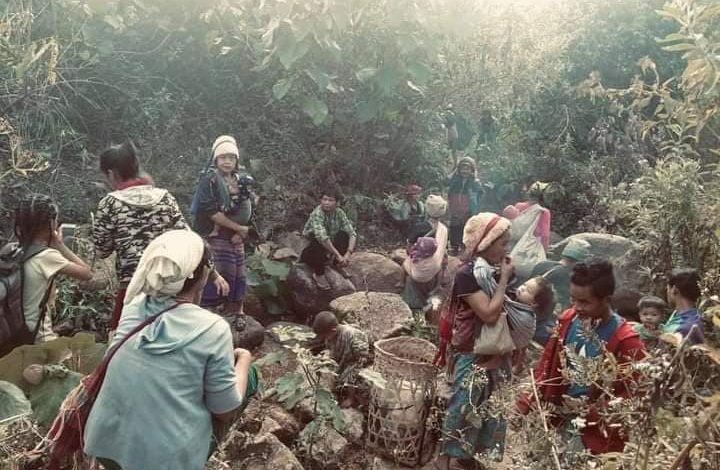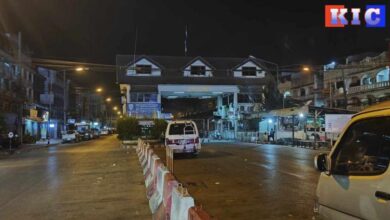Displaced Karen Villagers Unable to Harvest Their Crops, Because of Burma Army Militarization, Now Face Food Shortages
Increased militarization in Northern Karen State has resulted in villagers unable to harvest their crops and will lead to shortages of food.

Despite the Burma Army’s declaration of a five-month unilateral ceasefire from October, 2021 to February 2022, villagers have yet to witness a reduction in its troops in the area or less fighting.
Community based groups and Karen National Union (KNU) sources told Karen News Burma Army instead of reducing their numbers in the area, have been sending reinforcements to the Northern areas of Karen State.
The Karen National Liberation Army, the armed wing of the KNU, reports armed clashes are now increasing on a daily basis and the Burma Army has increased its offensives in the area.
The KNU said there were a total of 481 battles in October and November, this year in all its Brigades caused by the Burma Army increasing military operations despite its declared ceasefire.
The KNU’s Mutraw (Papun) District, the KNLA 5th Brigade, recorded 355 clashes in October and November.
Colonel Saw Htoo K’Shaw, Tactical Commander of the KNLA Brigade 5 told Karen News that as the dry season began, the Burma Army reinforced its troops, sent food, munitions and other supplies. The Burma Army reinforcements were used in security operations inside KNLA controlled territory causing fighting.
“The Burma Army sent its troops to secure their resupply routes. The fighting continues because we oppose their incursions into our territory. Our 5th Brigade has the responsibility to defend and fight back against invasions into our territory.”
Colonel Saw Htoo K’Shaw said Burma Army heavy machinery and large cargo vehicles recently arrived to Mu Theh in Kler Lwee Htoo (Nyaunglebin) District to force its way into the KNLA’s 5th Brigade, to secure resupplying routes to their frontline camps and to control and secure road access.”
Whenever there are armed clashes between the Burma army troops and the KNLA, Colonel Saw Htoo K’Shaw, said the Burma Army soldiers’ response after fighting with the KNLA was to retaliate by firing artillery shells into villagers’ farms and plantations.
“The Burma Army starts firing shells, intentionally targeting villagers’ farmland every time we fight in the area – this makes it hard for villagers to work their fields and tend their crops.”
Saw Htoo Kli, Director of the Karen Office of Relief and Development (KORD), a community based organization supporting and delivering emergency relief assistance to displaced villagers agreed with Colonel Saw Htoo K’Shaw assessment of the hardships facing villagers trying to work their farms in a conflict zone.
“Villagers living along the road between Hpapun and Kamamaung and areas close to Burma Army camps in Mutraw, are no longer able to harvest this year’s crops.” Saw Htoo Kli said.
The Karen Peace Support Network (KPSN) report published in November, 2021 estimates there are 82,220 people displaced in the Mutraw District, a result of Burma Army ground and air attacks, as well as targeted artillery shelling of villages.
Saw Htoo Kli said KORD had delivered emergency relief assistance to more than 50,000 displaced people forced from their homes by fighting and Burma Army attacks this year. Saw Htoo Kli said most of these communities are now unable to harvest enough crops for the coming year and this will cost a shortage of food stored until, if they are able to plant and harvest next year’s crops.
“Most of the displaced communities would have had stored food from this year’s harvest enough for only about three to four months. Now there’s no certainty that they will be able to farm and grow crops for next year.”
Saw Htoo Kli said displaced villagers who lived close to Burma Army camps and along Burma Army patrol routes, were no longer able to harvest their crops.
“We estimated as many as 25% of displaced villagers live in these areas and they are unable to get anything from their farms this year. These communities will need urgent assistance to cope with the situation and we will need to find support for them.”
Colonel Saw Htoo K’Shaw also said that many civilians forced out of their villages were now unable to harvest anything from their cultivation plots because of security risks.
“There are many villages, including Htwi Thee Eu, Khaw Klar, Kwee Chi, Mae Way and Wah Thoe Kho villages in Mutraw district, who we know unable to collect food stocks from their farms to live on.”




